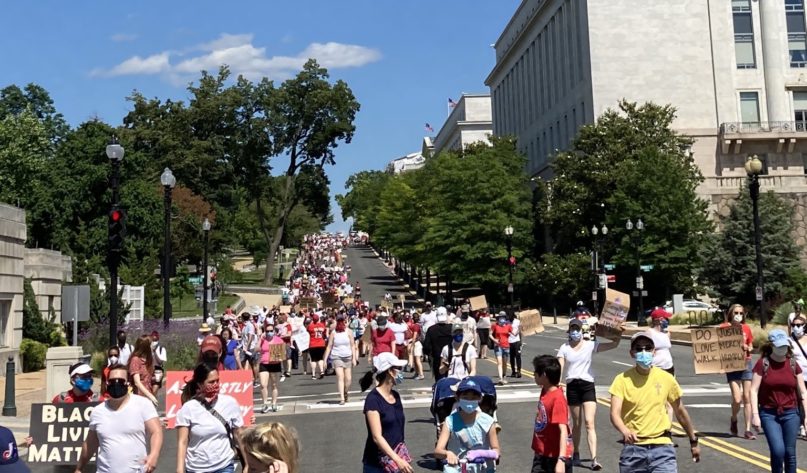You do know the purpose of religion, don’t you?
“To comfort the afflicted, and to afflict the comfortable.”
When it comes to that job description of faith, we are in an odd and paradoxical moment.
Since the middle of March, with the onset of COVID-19 and the more than 100,000 American deaths from that virus, religious leaders have been in the “comfort the afflicted” mode.
Without abandoning that role, over the past two weeks, since the murder of George Floyd and the national and international responses, we are now squarely in the “afflict the comfortable” role.
As I look back on my career in the rabbinate, I confess: those twin roles have always battled within me — and within the souls of many of my clergy colleagues. Especially, as is often the case, when we must move from one mode to another without skipping a beat.
This week, however, I find myself dwelling in the kingdom of “afflict the comfortable.”
Which brings me to a prayer that has always been one of my favorites in our Reform prayer book, Mishkan T’filah, published by the Central Conference of American Rabbis. Consider this except from that prayer, together with my commentary, which I have written for precisely this American moment.
Disturb us, Adonai, ruffle us from our complacency…
Disturb us. Make us uncomfortable. Ruffle us – as an adult playfully ruffles the neatly-combed hair of a child.
Yes, we want to be One with You, Eternal One – but we are not yet at one with ourselves.
We want Your peace and tranquility – but not yet.
Make us dissatisfied…
Adonai, do not tempt us with complacency.
Give us the gift of restlessness.
Remind us of Abraham and Sarah, who left the comfort of Ur, to follow Your vision. Give us a measure of their passion and their ache. Do not permit us an ounce of satisfaction with the world as it is, and with America as it is, and with this nation as it now is.
Dissatisfied with the peace of ignorance, the quietude which arises from a shunning of the horror, the defeat, the bitterness and the poverty, physical and spiritual, of humans.
The burdens and distractions of every day life, and our own heedless need for perpetual comfort and entertainment, block our ears and our souls. The petty idolatries of our time, of status and wealth and beauty, blind us.
Adonai, give us a gentle or not so gentle slap on the hand and on the head and on the heart.
Let us battle the human tendency to shun the horror – to look aside when a policeman’s knee snuffs out the life of an innocent man. Let us battle the tendency to not see the social and economic defeat that is the lot of so many of Your children. Let us not turn aside from the poverty that cripples Your children.
Let us place our dissatisfaction and our discomfort and our despair upon Your altar in the Temple on high, and accept the smoke of those offerings.
Shock us, Adonai, deny to us the false Shabbat which gives us the delusions of satisfaction amid a world of war and hatred…
In the words of the prophet Jeremiah: “They have lightly healed the hurt of My people, saying ‘Shalom shalom, v’ain shalom.’
Shalom, shalom, yet there is no shalom. Even as we say Shabbat shalom, let us not allow the vision of an eternal Shabbat delude us into thinking that such a Shabbat is already here.
Wake us, O God, and shake us from the sweet and sad poignancies rendered by half-forgotten melodies and rubric prayers of yester years…
Nostalgia is not what it used to be. Liberate us, Eternal One, from a Judaism of mere memory; from a Judaism only of ethnicity; from a Judaism only of Seinfeld and bagels. Redeem us from the prayers that we dimly remember but can no longer live. Help us make our Torah catch fire.
Make us know that the border of the sanctuary is not the border of living and the walls of Your temples are not shelters from the winds of truth, justice and reality.
There are no clear architectural rules that govern synagogue design. Except for one rule: a synagogue must have windows. It must have windows, so that we can see outside, beyond our sight lines, beyond our comfort zones. And, a synagogue must have windows, so that the light that pervades our world can enter those walls.
The author of the prayer was Mitchell Salem Fisher. He was a Reform rabbi, who had served briefly as the spiritual leader of Congregation Rodeph Sholom in New York.
On April 18, 1930, the New York Times reported that he had resigned from “ministry.”
In a letter to the synagogue president, Rabbi Fisher said that “the ideals of the synagogue are removed from the real issues of everyday living and that the office of rabbi has now become synonymous with that of “an exalted lecturer, entertainer and institution promotion agent.”
He continued:
Preachers enunciate ideals, but these must remain so indefinite, so unpointed, so unchallenging, so completely removed from the real issues of everyday living and struggling that these ideals become patently and utterly vain.
If Rabbi Fisher could have gazed exactly ninety years into the future, into this moment, and been able to see what my colleagues are saying and doing, perhaps he would have re-considered his decision.






